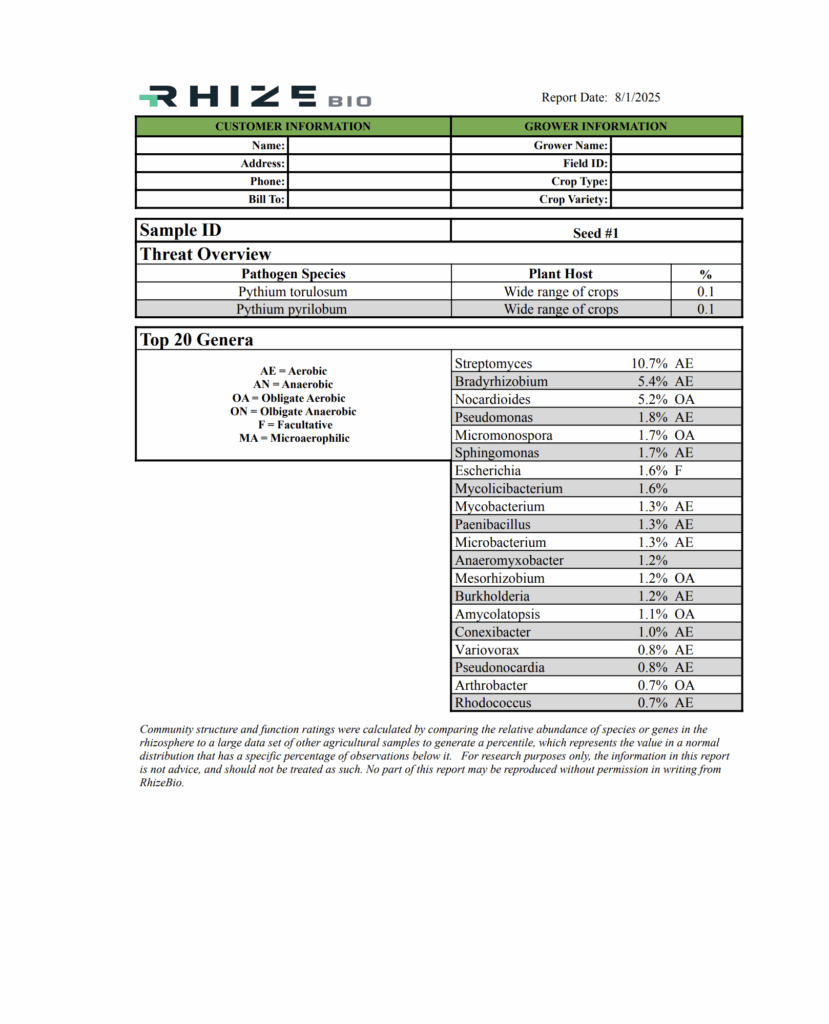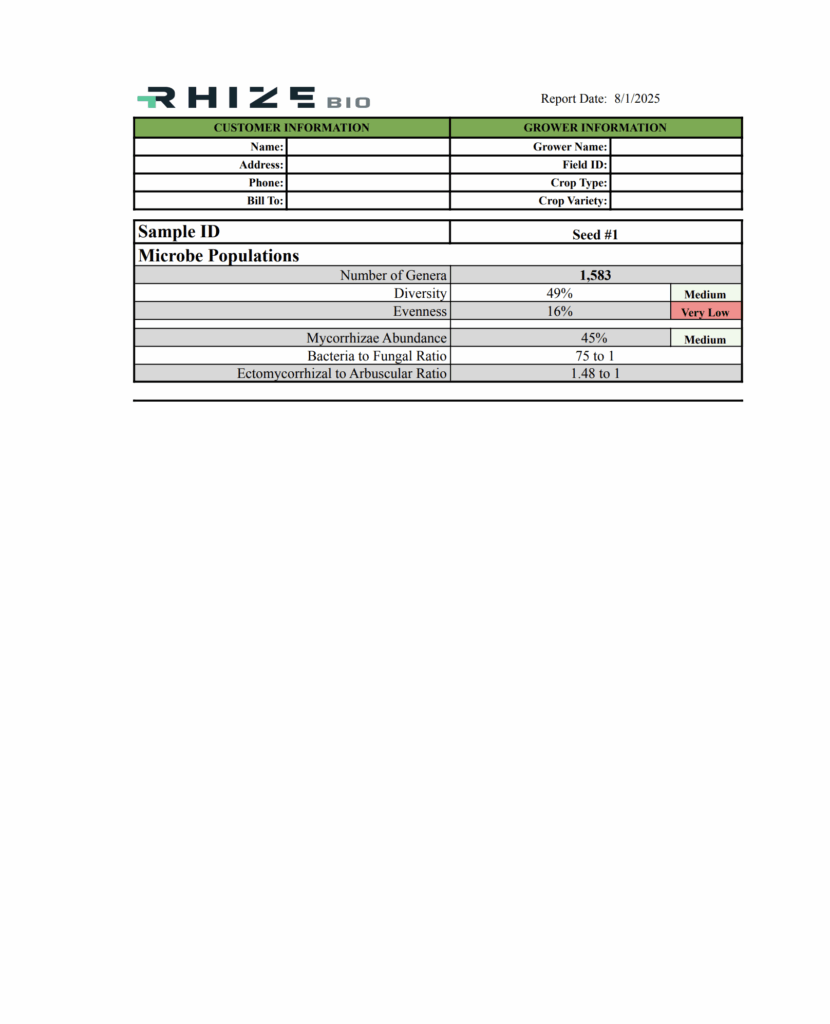DNA Tests
Seed DNA Test – Microbiome Origin & Inoculant Colonization Analysis
SKU: SM-01 Technology: Shotgun Metagenomics Read Depth: 10M
This test profiles the native microbiome of raw or treated seeds, identifying both beneficial endophytes and potential seedborne pathogens. Seeds are propagated in greenhouse conditions on germination paper, allowing RhizeBio to track how microbes transition into the rhizosphere without interference from soil-borne noise. Clients use this test to evaluate inoculant acceptance, pathogen load, and early-stage microbial signaling such as auxin production, all of which have been shown to influence future crop performance. Used by seed and input manufacturers, the Seed DNA Test is often paired with a greenhouse root DNA test to validate rhizosphere colonization and compare treated vs. untreated seed lots.
- Propagated in Greenhouse for Soil-Free Microbial Profiling
- Identifies Endophytes & Beneficial Microbial Colonizers
- Screens for Internal Seedborne Pathogens
- Detects Early Microbial Signals Like Auxin Pathways
- Paired with Greenhouse Root Test to Confirm Colonization
$249 /test
- 21-day turnaround from sample receipt
CO-01
Compost DNA Test
Targeting compost inputs, this test evaluates microbial diversity and functional potential through metagenomic sequencing. It determines compost maturity, stability, and biological quality to inform application decisions and optimize microbial inputs.
$224.00
GH-01
Greenhouse Root DNA Test
Designed for controlled trials, this test applies shotgun metagenomic DNA sequencing to roots grown in greenhouse conditions. By minimizing environmental variability, it isolates microbial effects on plant health and response to treatments with higher signal clarity
$299.00
GH-01
Greenhouse Root DNA Test
Designed for controlled trials, this test applies shotgun metagenomic DNA sequencing to roots grown in greenhouse conditions. By minimizing environmental variability, it isolates microbial effects on plant health and response to treatments with higher signal clarity
$299.00
MA-01
Manure DNA Test
This test investigates the microbial and pathogen composition of livestock manure. Using metagenomics, it identifies microbial populations that contribute to nutrient cycling or disease risk, guiding safe, sustainable use in cropping systems.
$224.00
Manure Submittal Sheet →
Why Rhizebio Testing?
Our advanced testing methods provide actionable insights that help you make informed decisions for your agricultural practices.

Cutting-Edge Science
Advanced microbiome analysis using the latest sequencing technology.

Actionable Insights
Advanced microbiome analysis using the latest sequencing technology.

Sustainable Future
Helping you build healthier soils and more sustainable agricultural systems.
Ready to Transform Your Agricultural Practices?
Start your journey toward sustainable agriculture with Rhizebio’s advanced microbiome testing services.
Frequently Asked Questions
What makes RhizeBio™ different from other soil tests?
Unlike traditional soil testing that measures chemical nutrients, the Rhize Soil Health Test uses advanced metagenomic tools to measure soil biodiversity to predict function. Soil is one of the most complex environments on earth, with billions of microbes in each gram. The only reliable way to measure soil biodiversity is through advanced next generation sequencing platforms and metagenomic applications.
How does the microbiome relate to soil?
The microbiome represents all of the microorganisms that inhabit a particular environment. In the case of soil, the microbiome is complex and diverse and it functions to retain nutrients, cycle nutrients for plant availability, promote aggregate formation, mineralize nutrients, suppress disease and degrade organic and inorganic compounds. In short, a healthy soil microbiome increases crop yield and protects crops from disease and other stresses.
What is the importance of genomics in RhizeBio's approach to soil health?
Genomics allows us to understand the genetic makeup of the soil’s microbiome. This knowledge is crucial in assessing soil health and biodiversity. At RhizeBio, we use genomics to transform raw soil DNA sequencing data into user-friendly and informative soil health reports, empowering farmers to make informed decisions about their soil management practices.
How are microbes beneficial to soil and why is it important to measure the microbes in my soil?
The microbes in soil improve crop production in many ways. Here are just a few:
- Producing horomones that promote root growth
- Increasing water intake
- Adding nutrients to the soil through the breakdown of organic and inorganic compounds
- Improving nutrient absorption by breaking down vitamins and other compounds into bioavailable forms
- Improving soil structure
- Improving crop immunity
- Protecting crops from harmful bacteria, fungi, nematodes, and other pests
Get in Touch
Ready to transform your agricultural practices? Contact our team of experts to learn more about our advanced soil testing services.
By submitting this form, I accept RhizeBio’s Privacy Policy.*
Fields marked with an asterisk (*) are required

